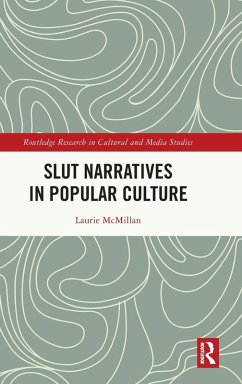Slut Narratives in Popular Culture explores representations of slut shaming and the term "slut" in U.S. popular media, 2000-2020. It argues that cultural narratives of intersectional gender identities are gradually but unevenly shifting to become more progressive and sex positive.
Moving beyond prior research on slut shaming, which exposes problematic conflations between women's morality and a sexual purity associated with White economic privilege, this book examines how narratives that perpetuate slut shaming are both contested and reinscribed through stories we circulate. It emphasizes effects of twenty-first century developments in digital communication and entertainment. The rapid evolution of genres combined with increased access to the consumption and production of texts stimulates more diverse storytelling. The book's analyses demonstrate twenty-first-century changes in how slut shaming is depicted and understood while encouraging consumers and producers of pop culture to attend to cultural narratives as they reify or challenge the subordination of vulnerable populations.
Aimed primarily at an academic audience, this book will also engage general readers interested in intersectional feminism, pop culture, new media, digital technologies, and sociolinguistic change. Readers will become more adept at deconstructing assumptions embedded in popular media, especially narratives informing slut shaming.
Moving beyond prior research on slut shaming, which exposes problematic conflations between women's morality and a sexual purity associated with White economic privilege, this book examines how narratives that perpetuate slut shaming are both contested and reinscribed through stories we circulate. It emphasizes effects of twenty-first century developments in digital communication and entertainment. The rapid evolution of genres combined with increased access to the consumption and production of texts stimulates more diverse storytelling. The book's analyses demonstrate twenty-first-century changes in how slut shaming is depicted and understood while encouraging consumers and producers of pop culture to attend to cultural narratives as they reify or challenge the subordination of vulnerable populations.
Aimed primarily at an academic audience, this book will also engage general readers interested in intersectional feminism, pop culture, new media, digital technologies, and sociolinguistic change. Readers will become more adept at deconstructing assumptions embedded in popular media, especially narratives informing slut shaming.
"There are few words that have both historical and current currency in the lives of women as the word, slut. One only has to look at the weaponization of the word by former President Trump to defame women he was found guilty of sexually harassing and assaulting in the past to its use as a form of empowerment by young women protesting sexual violence in Slut Walk Marches. McMillian's analysis is particularly powerful because she offers a rhetorical, linguistic, and sociocultural analysis of why this is the case. McMillan's nuanced examination of a variety of texts, television shows, and podcasts, reveals the legacies and continuities of sexist, racist, and classist ideologies that have shaped the material effects of the term slut, as well as the way activists, artists, and social commentators have challenged and reinscribed it. A great and deeply important read!"
R. Danielle Egan, author of Becoming Sexual: A Critical Appraisal of Girls and Sexualization
"Laurie McMillan's new book, Slut Narratives in Popular Culture, weaves together cultural narratives of the slut and slut shaming over the past twenty years to argue that a more progressive view of slut shaming is developing in pop culture. She gives the reader hope that the deep-seated societal stigma against sexually active women can be overcome with an emphasis on sex positivity and with intersectional strategies for a progressive reimagining of the slut narrative. Highly recommended."
Meredith Ralston, author of Slut-Shaming, Whorephobia and the Unfinished Sexual Revolution
"In light of the vast harm caused by slut-shaming, I appreciate this hopeful book. McMillan shows in this page turner that cultural narratives can challenge toxic belief systems and that evolving representations are making their mark. Slut Narratives in Popular Culture is an evidence-based pep talk that shows us the way to a better future."
Leora Tanenbaum, author of I Am Not a Slut: Slut-Shaming in the Age of the Internet
"Well-researched, thorough, and compelling, Slut Narratives in Popular Culture uses media analysis as a useful framework to investigate the ever-evolving discourse on slut shaming. McMillan avoids over-simplifications and instead creates a nuanced, thoughtful analysis of how changes to our language are only as effective as the corresponding changes to the cultural landscape. This book is a must-read for anyone interested in feminism, media, or slut rhetoric."
Grace Wetzel, gender/sex researcher and TEDx Speaker, Let's Talk about Sex: The Reality of the Sexual Pleasure Disparity
R. Danielle Egan, author of Becoming Sexual: A Critical Appraisal of Girls and Sexualization
"Laurie McMillan's new book, Slut Narratives in Popular Culture, weaves together cultural narratives of the slut and slut shaming over the past twenty years to argue that a more progressive view of slut shaming is developing in pop culture. She gives the reader hope that the deep-seated societal stigma against sexually active women can be overcome with an emphasis on sex positivity and with intersectional strategies for a progressive reimagining of the slut narrative. Highly recommended."
Meredith Ralston, author of Slut-Shaming, Whorephobia and the Unfinished Sexual Revolution
"In light of the vast harm caused by slut-shaming, I appreciate this hopeful book. McMillan shows in this page turner that cultural narratives can challenge toxic belief systems and that evolving representations are making their mark. Slut Narratives in Popular Culture is an evidence-based pep talk that shows us the way to a better future."
Leora Tanenbaum, author of I Am Not a Slut: Slut-Shaming in the Age of the Internet
"Well-researched, thorough, and compelling, Slut Narratives in Popular Culture uses media analysis as a useful framework to investigate the ever-evolving discourse on slut shaming. McMillan avoids over-simplifications and instead creates a nuanced, thoughtful analysis of how changes to our language are only as effective as the corresponding changes to the cultural landscape. This book is a must-read for anyone interested in feminism, media, or slut rhetoric."
Grace Wetzel, gender/sex researcher and TEDx Speaker, Let's Talk about Sex: The Reality of the Sexual Pleasure Disparity








